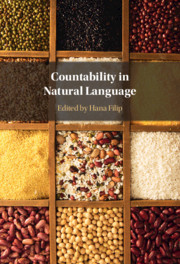Book contents
- Countability in Natural Language
- Countability in Natural Language
- Copyright page
- Contents
- Contributors
- Preface
- Introduction
- 1 Proportional Many/Much and Most
- 2 Quantity Systems and the Count/Mass Distinction
- 3 Counting Aggregates, Groups and Kinds: Countability from the Perspective of a Morphologically Complex Language
- 4 Individuating Matter over Time
- 5 Reduplication as Summation
- 6 Iceberg Semantics for Count Nouns and Mass Nouns: How Mass Counts
- 7 Indexical Inference: Counting and Measuring in Context
- 8 Counting and Measuring and Approximation
- 9 The Count/Mass Distinction for Granular Nouns
- Index
- References
Introduction
Published online by Cambridge University Press: 11 June 2021
- Countability in Natural Language
- Countability in Natural Language
- Copyright page
- Contents
- Contributors
- Preface
- Introduction
- 1 Proportional Many/Much and Most
- 2 Quantity Systems and the Count/Mass Distinction
- 3 Counting Aggregates, Groups and Kinds: Countability from the Perspective of a Morphologically Complex Language
- 4 Individuating Matter over Time
- 5 Reduplication as Summation
- 6 Iceberg Semantics for Count Nouns and Mass Nouns: How Mass Counts
- 7 Indexical Inference: Counting and Measuring in Context
- 8 Counting and Measuring and Approximation
- 9 The Count/Mass Distinction for Granular Nouns
- Index
- References
Summary
Early theories of the mass/count distinction in formal semantics and philosophy attempted to analyze the meanings of mass and count nouns in terms of properties like cumulativity, divisivity (due to Quine 1960), atomicity, and homogeneity, among others (see Pelletier 1979 and references therein). Many also agree that such properties are best represented in algebraic or mereological terms. This idea was introduced into formal semantics by Link (1983). His main innovation is to propose that the domain of (concrete) entities has the algebraic structure of a complete join semi-lattice. This allows him to model the differences between mass and count nouns, on the one hand, as well as similarities between mass and plural nouns, on the other hand. There is a sortal semantic distinction between mass and count nouns, which is based on the atomic and non-atomic ontological distinction (see, e.g., Link 1983, 1998), and modeled by means of an atomic and a non-atomic join semi-lattice, respectively. Count nouns are interpreted in the atomic lattice, mass nouns in the non-atomic one. Mass nouns pattern with plurals in having the property of cumulative reference (the term coined by Quine (1960) for the semantics of mass terms, realized as nouns or adjectives).
Information
- Type
- Chapter
- Information
- Countability in Natural Language , pp. 1 - 13Publisher: Cambridge University PressPrint publication year: 2021
